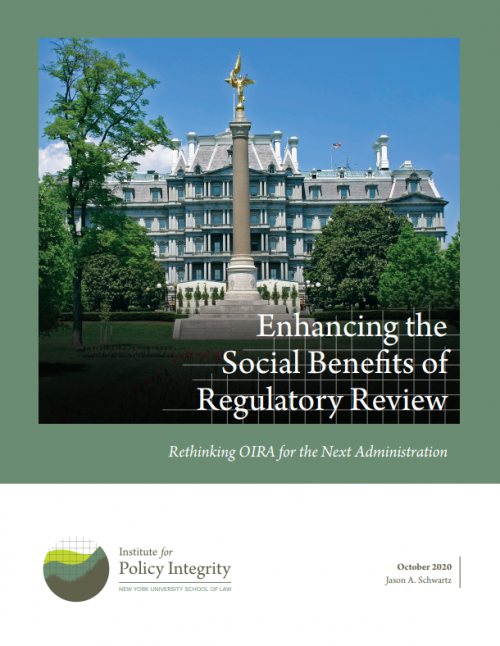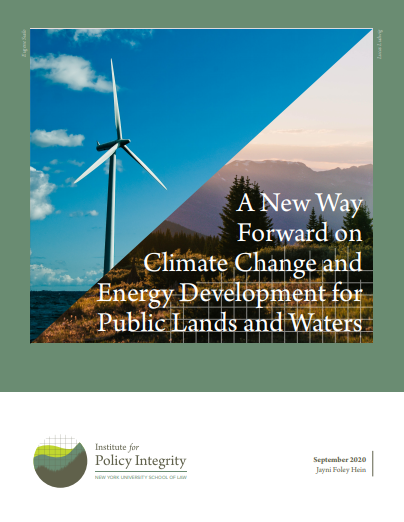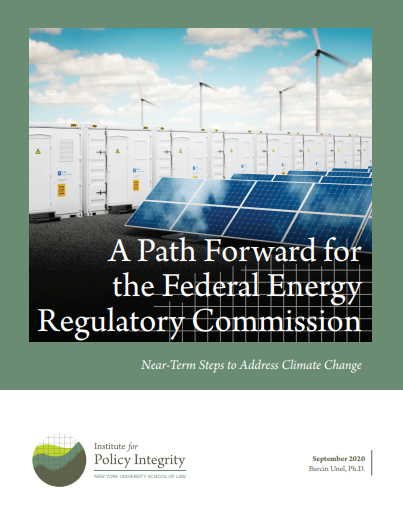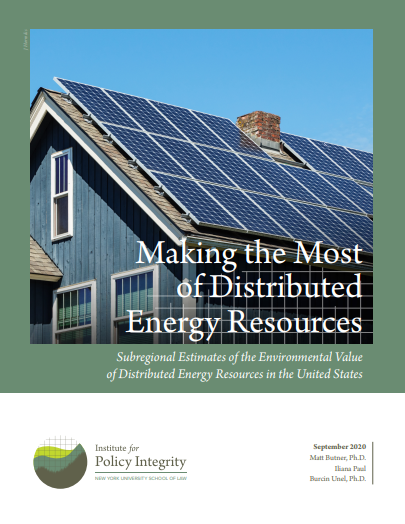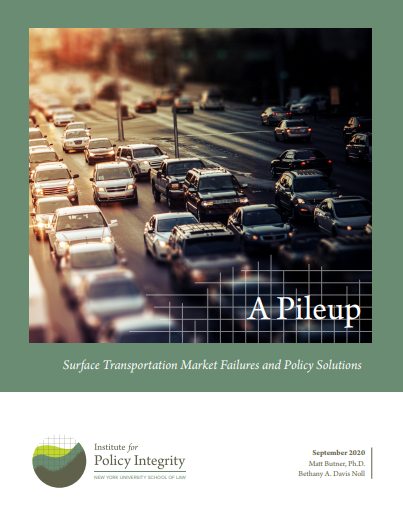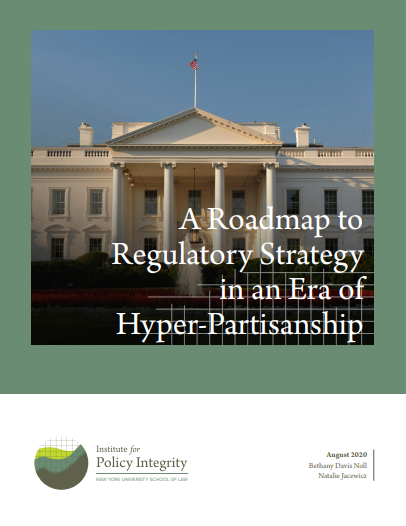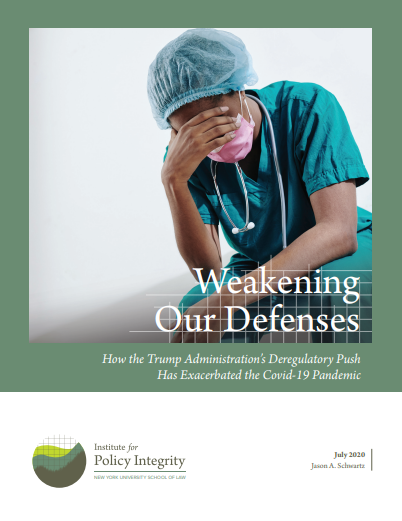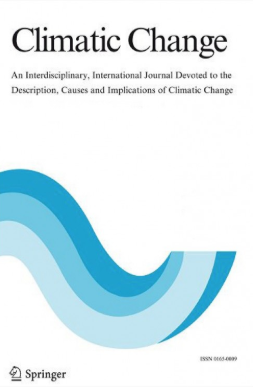-
Enhancing the Social Benefits of Regulatory Review
Rethinking OIRA for the Next Administration
In recent years, federal leadership has distorted the practice of regulatory analysis and has eroded the integrity of the government’s regulatory review structure as coordinated by the Office of Information and Regulatory Affairs (OIRA). The result has been a torrent of deregulatory actions that have worked against the best interests of the American people and their health, safety, environment, and financial well-being. Our report details the path forward on regulatory review, which is to first surgically excise recent distortions, and then to reaffirm the best principles and practices from the past, while adding key corrections and enhancements. Implementing the reforms recommended in this report will refocus OIRA on helping agencies once again use regulations to maximize net social welfare.
-
A New Way Forward on Climate Change and Energy Development for Public Lands and Waters
The Department of the Interior has yet to develop a comprehensive plan to accurately account for, manage, and mitigate the greenhouse gas emissions that result from the extraction and combustion of fossil fuels from public lands and waters. This document describes immediate and longer-term actions that Interior’s Bureau of Land Management and Bureau of Ocean Energy Management should take to reform public lands management consistent with climate change, conservation, and fiscal reform priorities.
-
A Path Forward for the Federal Energy Regulatory Commission
Near-Term Steps to Address Climate Change
The Federal Energy Regulatory Commission should take an active role in better aligning regulatory practices with climate policies, speeding up development of necessary transmission infrastructure, and reforming energy market rules. This report details the specific policy reforms that federal policymakers should pursue to take advantage of important opportunities energy markets can provide to combat climate change while ensuring an economically efficient and speedy clean energy transition.
-
Making the Most of Distributed Energy Resources
Subregional Estimates of the Environmental Value of Distributed Energy Resources in the United States
This report provides a new set of hourly E-Values for the whole United States, broken down into 19 subregions, using an open-source reduced-order dispatch model. The patterns uncovered by these estimates can help policymakers design economically efficient DER policies to reduce air pollution from electricity generators.
-
A Pileup
Surface Transportation Market Failures and Policy Solutions
Surface transportation market failures, including greenhouse gas emissions, local air pollution, traffic congestion, and traffic collisions, generate billions of dollars in economic harm every year. Guided by economic principles, this report outlines several options for reforming U.S. surface transportation that account for technological, institutional, and political realities. It also highlights the unequal burden of market failures in the transportation sector and discusses policy solutions that can help lead to more just outcomes.
-
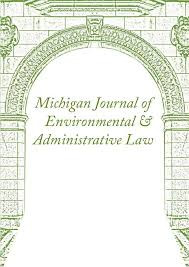
Implementing NEPA in the Age of Climate Change
Published in the Michigan Journal of Environmental & Administrative Law
Under the National Environmental Policy Act, agencies must consider the environmental impacts of major federal actions before they can move forward. But agencies frequently downplay or ignore the climate change impacts of their projects in NEPA analyses, citing a slew of technical difficulties and uncertainties. This article, published in the Michigan Journal of Environmental & Administrative Law, aims to highlight best practices so that agency offices can learn from one another, fulfill NEPA’s mandate, and begin to provide leadership in the fight against climate change.
-
A Roadmap to Regulatory Strategy in an Era of Hyper-Partisanship
This report discusses how an administration that begins a new term can navigate regulatory strategy. It offers advice on navigating this terrain for White House officials, the Office of Information and Regulatory Affairs, transition teams at agencies, and advocates. The report also contains a section on how an incoming administration can roll back the prior administration’s rules if there is an inter-party transition.
-

Markets, Externalities, and the Federal Power Act: The Federal Energy Regulatory Commission’s Authority to Price Carbon Emissions
Article revised for the Environmental Law Reporter
This article, excerpted from Davis Noll and Unel’s article in the NYU Environmental Law Journal, provides a comprehensive economic framework to show that addressing the CO2 externality through a carbon price falls within FERC’s authority to ensure an efficient market.
-
Weakening Our Defenses
How the Trump Administration’s Deregulatory Push Has Exacerbated the Covid-19 Pandemic
The failure of the federal government to adequately safeguard the health, environment, and economy of the United States with efficient regulatory protections is not a new phenomenon. For over three years now, the Trump administration has systematically delayed, undermined, and erased key regulations that protect our health, our environment, our workplaces, our living conditions, and our economy. The steady erosion of regulatory safeguards has severely compromised our baseline defenses against Covid-19.
-
Wisdom of the Experts
Using Survey Responses to Address Positive and Normative Uncertainties in Climate-Economic Models
The social cost of carbon (SCC) and the climate-economic models underlying this prominent US climate policy instrument are heavily affected by modeler opinion and therefore may not reflect the views of most climate economists. To test whether differences exist, we recalibrate key uncertain model parameters using formal expert elicitation: a multi-question online survey of individuals who have published scholarship on the economics of climate change. Read the article, published in Climatic Change.
Viewing recent projects in Publications

